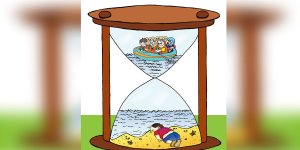Engin Erkiner Wrote DATES OF EXHIBITION
DATES OF EXHIBITION Engin Erkiner
Exile is a general concept; It shows different characteristics according to the period, the countries that have been abandoned and come, and the people who had to go. People from the same country experience different exile when they go to different countries. Isabele Allende's novel Dieser weite Weg describes the double exile of a man and a woman. After the Falangists won the Spanish civil war, they went to Chile via France; After more than thirty years of living in this country, they will have to go to Venezuela because of the Pinochet coup. The language of the countries they left and went to is the same: Spanish. The exiles of those who go to a country whose language they know and those who go to those who do not know will be different. In the second example – like Chileans going to the Netherlands – dumbness and therefore lack of communication is a major problem, while those who go to Venezuela will not experience this. Anna Seghers, one of the well-known German writers, does not consider it an exile when she goes to France because of the Nazis, because she knows the language and culture of the new country. The situation will change when he has to go to Mexico from here as a result of the Nazi occupation. All that happened is exile, but the content of the same word is different. The original exiles cannot be understood when the general determinations about the exile are satisfied, and each exile has its originality and this is divided into sub-specificities. For example, in European exiles from Turkey, the person's going to Germany or Switzerland, taking asylum here will affect the later life of this political person. While the relationship between asylum seekers and workers who came and settled years ago in Germany can be considered intense, the situation is different in Switzerland, where labor migration is more recent.
AUTHENTICITY OF THE TURKISH EXPORTIf we limit our subject to the European exiles that make up the majority; 1. People left one country and came to another country where there are fewer people who speak the language of that country. Their situation was better than those who went into exile from Chile to Mexico, because while they could not communicate with the majority society of the country they came from due to a different language, they came among the people who were less in number but spoke the same language. While Chileans could not find many Chileans in Mexico, the situation was different for Turkish people, and these people, who were more political, would encounter a mass that they had been working with for years in different organizations. A similar situation cannot be mentioned for Chileans.
2. The round trip in classical exile is as follows: People have to leave their country to other countries. They live here for 10-20 years, sometimes longer, and when the conditions change, they return, even if not as much as the number of those who left. Chileans can be given as an example in this regard. There have been comebacks after the Pinochet dictatorship. While there are departures and returns in classical exile, there are departures and returns in European exiles.
Starting from 1981 – there is also a previous one, but we limit the subject to the years when political immigration intensified – there were intense arrivals to European countries, especially Germany. Ten years later, the cases of those tried under Articles 141 and 142 among this mass were dropped and many people returned, including those who benefited from the new execution law. In the first half of the 1990s, Kurdish exiles began to arrive. The number of departures and new arrivals can only be estimated and it can be said that the latter outnumbered the former. While the composition of the mass remains approximately the same in the classical exile, the composition changes as a result of the returns and new arrivals in the European exiles. This is another important difference from classical exile. Then came a different mass, Fettullahists. In other countries, the participation of a politically quite different mass in the process – within the limits of the examples I know – has not been experienced. Simultaneously with this, the exile of the members of the Decree-Law – mainly academics – began. A few years later some of them would return.
For a few years, there has been a "voluntary exile", mainly of doctors. These people do not have political and economic problems, but they do not want to live there. Some of them will settle in the new country, usually Germany, and some will return. How can such a multi-component and active exile process be examined? The number of arrivals can only be estimated and their accuracy is questionable, the same applies to those who return. Here, it is necessary to draw attention to a misconception among the majority of Turkish people: to think of exile as a process involving only those who come. This fallacy is inevitable when you think of the classical process as always valid, omitting the originality of the European exiles. It is an increase in the number of open shoots.
For a few years, there has been a "voluntary exile", mainly of doctors. These people do not have political and economic problems, but they do not want to live there. Some of them will settle in the new country, usually Germany, and some will return. How can such a multi-component and active exile process be examined? The number of arrivals can only be estimated and their accuracy is questionable, the same applies to those who return. Here, it is necessary to draw attention to a misconception among the majority of Turkish people: to think of exile as a process involving only those who come. This fallacy is inevitable when you think of the classical process as always valid, omitting the originality of the European exiles. It is an increase in the number of open shoots.
In Turkey, the issue comes to the fore, albeit slowly, and researchers send questionnaires to some exiles. It is understood from the questions that the researchers do not have a good grasp of the subject. At first they did not understand the dynamic character of European exile. As the composition of the exiles is constantly changing, the people in exile are also changing, they do not have the same evaluations as when they came 20-30 years ago, and even their identity changes in a positive or negative way. Exile studies; It has a scope beyond the questions of how you left the country, what difficulties did you encounter in the country you went to. The following methods can be mentioned in the study of European exile. First; It is a comparative review. This comparison should include the similarities and differences between the European exile of other countries—for example, the Greeks, and ours. More important is the comparison within European exiles.
1. Comparison of arrivals at different times. Differences in assessment on different topics between newcomers – less than five years ago – and those who came at least 20 years ago.
2. Comparisons between different shoot groups. Like the people of the Decree Law with the deportations of September 12…
3. Change in exile as a person. Have their evaluations of exile changed in, say, 20 years, and if so, how?
4. By expanding the previous article, it can also be evaluated within the scope of exiles – individual dates. Although oral history is appropriate as the second method here, this method does not mean putting the tape recorder in front of the person and saying "tell me". It includes a grand theory and different approaches to be applied according to the situation. Knowing the subject is not enough, the method must also be learned.
Another important subject of study is the struggle of the Turkish state with the European exiles in Europe.
After 1990, the cadres changed and TR strengthened its open and secret organization in European countries. From notifying many names to TR Interpol and asking them to be arrested and extradited, to assassination attempts, to arresting people who go to Turkey and deemed objectionable without constant monitoring, to abducting people, to constantly collecting information about different left-wing individuals and organizations, it is engaged in a wide and intense activity. As another issue, the situation of women can be examined. Similar and different aspects of their exile to those of men, as well as the differences in exiles of women who came at different times... The exile of the Kurds is an issue in itself.
CONCLUSION Two methods stand out in the study of exile: oral history and comparison. Especially the second method is widely used in political science and sociology. Being an exile does not mean having knowledge of the theory of exile and its characteristics that vary from country to country. The theory – including methods – needs to be learned. European exile is an understudied, almost empty field. As far as I know, the subject of change in exile has never been studied and awaits its researchers.



 Türkçe
Türkçe 



























